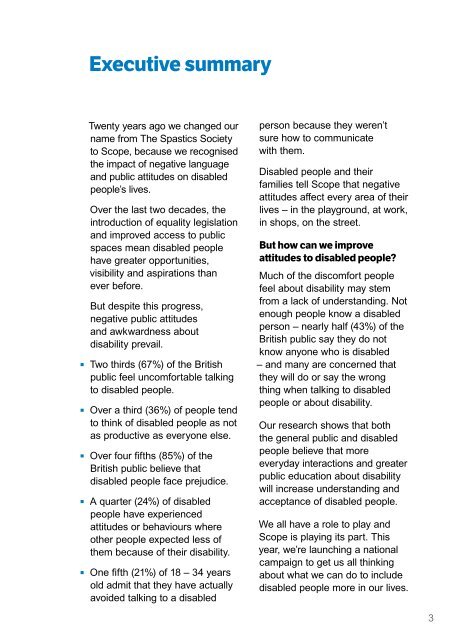Current attitudes towards disabled people
Current-attitudes-towards-disabled-people.pdf?ext=
Current-attitudes-towards-disabled-people.pdf?ext=
Create successful ePaper yourself
Turn your PDF publications into a flip-book with our unique Google optimized e-Paper software.
Executive summary<br />
Twenty years ago we changed our<br />
name from The Spastics Society<br />
to Scope, because we recognised<br />
the impact of negative language<br />
and public <strong>attitudes</strong> on <strong>disabled</strong><br />
<strong>people</strong>’s lives.<br />
Over the last two decades, the<br />
introduction of equality legislation<br />
and improved access to public<br />
spaces mean <strong>disabled</strong> <strong>people</strong><br />
have greater opportunities,<br />
visibility and aspirations than<br />
ever before.<br />
But despite this progress,<br />
negative public <strong>attitudes</strong><br />
and awkwardness about<br />
disability prevail.<br />
•<br />
Two<br />
thirds (67%) of the British<br />
public feel uncomfortable talking<br />
to <strong>disabled</strong> <strong>people</strong>.<br />
•<br />
Over<br />
a third (36%) of <strong>people</strong> tend<br />
to think of <strong>disabled</strong> <strong>people</strong> as not<br />
as productive as everyone else.<br />
•<br />
Over<br />
four fifths (85%) of the<br />
British public believe that<br />
<strong>disabled</strong> <strong>people</strong> face prejudice.<br />
•<br />
A<br />
quarter (24%) of <strong>disabled</strong><br />
<strong>people</strong> have experienced<br />
<strong>attitudes</strong> or behaviours where<br />
other <strong>people</strong> expected less of<br />
them because of their disability.<br />
•<br />
One<br />
fifth (21%) of 18 – 34 years<br />
old admit that they have actually<br />
avoided talking to a <strong>disabled</strong><br />
person because they weren’t<br />
sure how to communicate<br />
with them.<br />
Disabled <strong>people</strong> and their<br />
families tell Scope that negative<br />
<strong>attitudes</strong> affect every area of their<br />
lives – in the playground, at work,<br />
in shops, on the street.<br />
But how can we improve<br />
<strong>attitudes</strong> to <strong>disabled</strong> <strong>people</strong>?<br />
Much of the discomfort <strong>people</strong><br />
feel about disability may stem<br />
from a lack of understanding. Not<br />
enough <strong>people</strong> know a <strong>disabled</strong><br />
person – nearly half (43%) of the<br />
British public say they do not<br />
know anyone who is <strong>disabled</strong><br />
– and many are concerned that<br />
they will do or say the wrong<br />
thing when talking to <strong>disabled</strong><br />
<strong>people</strong> or about disability.<br />
Our research shows that both<br />
the general public and <strong>disabled</strong><br />
<strong>people</strong> believe that more<br />
everyday interactions and greater<br />
public education about disability<br />
will increase understanding and<br />
acceptance of <strong>disabled</strong> <strong>people</strong>.<br />
We all have a role to play and<br />
Scope is playing its part. This<br />
year, we’re launching a national<br />
campaign to get us all thinking<br />
about what we can do to include<br />
<strong>disabled</strong> <strong>people</strong> more in our lives.<br />
3


